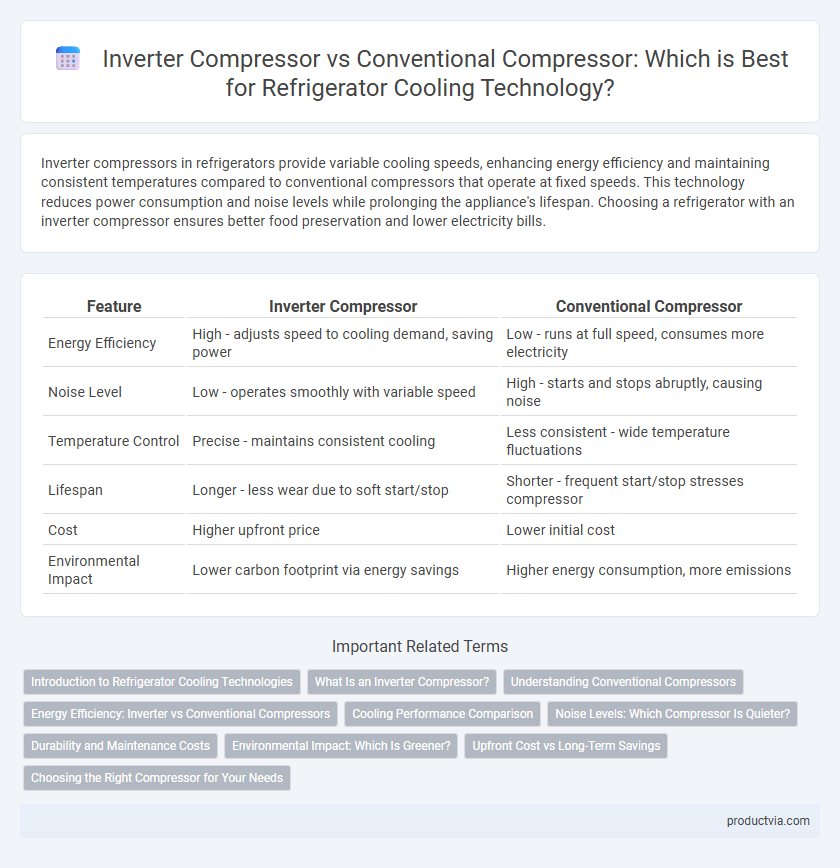Inverter compressors in refrigerators provide variable cooling speeds, enhancing energy efficiency and maintaining consistent temperatures compared to conventional compressors that operate at fixed speeds. This technology reduces power consumption and noise levels while prolonging the appliance's lifespan. Choosing a refrigerator with an inverter compressor ensures better food preservation and lower electricity bills.
Table of Comparison
| Feature | Inverter Compressor | Conventional Compressor |
|---|---|---|
| Energy Efficiency | High - adjusts speed to cooling demand, saving power | Low - runs at full speed, consumes more electricity |
| Noise Level | Low - operates smoothly with variable speed | High - starts and stops abruptly, causing noise |
| Temperature Control | Precise - maintains consistent cooling | Less consistent - wide temperature fluctuations |
| Lifespan | Longer - less wear due to soft start/stop | Shorter - frequent start/stop stresses compressor |
| Cost | Higher upfront price | Lower initial cost |
| Environmental Impact | Lower carbon footprint via energy savings | Higher energy consumption, more emissions |
Introduction to Refrigerator Cooling Technologies
Inverter compressors in refrigerators use variable speed technology to adjust cooling power based on real-time demand, resulting in enhanced energy efficiency and quieter operation compared to conventional compressors, which operate at a fixed speed. This advanced cooling technology maintains consistent temperatures, reduces wear and tear, and contributes to lower electricity consumption. As a result, inverter compressor refrigerators offer improved performance and longer lifespan over traditional models with conventional compressors.
What Is an Inverter Compressor?
An inverter compressor in refrigerator technology continuously adjusts its speed to match cooling demands, resulting in energy-efficient operation and consistent temperature maintenance. Unlike conventional compressors that operate at fixed speeds, inverter compressors reduce power consumption by modulating motor speed, leading to quieter performance and extended appliance lifespan. This technology optimizes cooling by precisely controlling the compressor, minimizing energy waste and enhancing overall refrigerator efficiency.
Understanding Conventional Compressors
Conventional compressors in refrigerators operate with a fixed-speed motor that cycles on and off to maintain the desired temperature, leading to fluctuations in cooling efficiency and higher energy consumption. These compressors run at full capacity regardless of the cooling demand, causing more wear and tear and increased noise levels compared to modern alternatives. Understanding the mechanical simplicity and operational limitations of conventional compressors highlights why inverter technology offers improved energy savings and consistent temperature control.
Energy Efficiency: Inverter vs Conventional Compressors
Inverter compressors in refrigerators operate by adjusting their speed based on cooling demand, significantly reducing energy consumption compared to conventional compressors that run at a constant speed. This variable speed technology leads to energy savings of up to 30-50%, improving overall efficiency and reducing electricity bills. Conventional compressors also cause more temperature fluctuations, whereas inverter models maintain consistent cooling with less power usage.
Cooling Performance Comparison
Inverter compressors adjust their speed according to cooling demand, providing more precise and consistent temperature control compared to conventional compressors that operate at fixed speeds. This adaptive technology enhances cooling efficiency by reducing temperature fluctuations and maintaining a stable internal environment for optimal food preservation. Studies show refrigerators with inverter compressors can reduce energy consumption by up to 30%, while delivering faster cooling performance and quieter operation.
Noise Levels: Which Compressor Is Quieter?
Inverter compressors in refrigerators operate at variable speeds, significantly reducing noise levels compared to conventional compressors that run at fixed speeds with frequent on/off cycles. The continuous and smooth operation of inverter compressors minimizes vibration and mechanical noise, making them quieter appliances in kitchens and living spaces. Studies show inverter compressor refrigerators can reduce noise by up to 40% or more compared to traditional models, enhancing user comfort.
Durability and Maintenance Costs
Inverter compressors in refrigerators offer enhanced durability due to their ability to operate at variable speeds, reducing wear and tear compared to the constant high-speed operation of conventional compressors. This technology results in lower maintenance costs as inverter compressors experience less mechanical stress and have fewer breakdowns over time. Conventional compressors often require more frequent repairs and replacements, increasing the total cost of ownership.
Environmental Impact: Which Is Greener?
Inverter compressors in refrigerators offer superior energy efficiency by adjusting motor speed to match cooling demand, significantly reducing electricity consumption and greenhouse gas emissions compared to conventional compressors with fixed speed operation. The reduced energy use lowers the carbon footprint of inverter-equipped refrigerators, making them a greener choice for environmentally conscious consumers. Conventional compressors cycle on and off frequently, causing higher energy spikes and increased wear, which contributes to greater environmental impact over the appliance's lifecycle.
Upfront Cost vs Long-Term Savings
Inverter compressors in refrigerators typically have a higher upfront cost compared to conventional compressors due to advanced technology and energy-efficient components. However, inverter compressors offer substantial long-term savings through reduced electricity consumption, often lowering energy bills by 30-50% over the appliance's lifespan. Conventional compressors may be less expensive initially but result in higher operating costs and less efficient temperature regulation.
Choosing the Right Compressor for Your Needs
Inverter compressors offer precise temperature control and energy efficiency by adjusting their speed based on cooling demand, resulting in quieter operation and lower electricity bills compared to conventional compressors that run at a constant speed. Conventional compressors tend to be less expensive upfront but may lead to higher energy consumption and temperature fluctuations, making them suitable for budget-conscious buyers with moderate cooling needs. Selecting the right compressor depends on factors like energy savings, noise levels, and initial cost, ensuring the refrigerator meets your specific usage patterns and long-term efficiency goals.
Inverter compressor vs conventional compressor for refrigerator cooling technology Infographic

 productvia.com
productvia.com